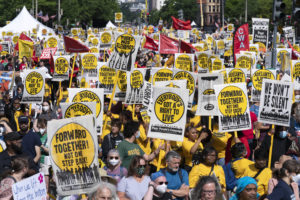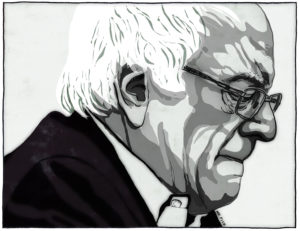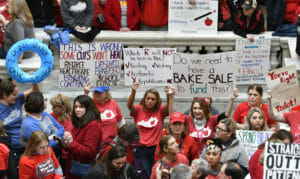Only the Little People Pay Taxes
The Democratic candidates have paid much attention to the president's horrendous foreign policy, but what of his tax cuts, which have crippled the treasury for the sake of the yachting class?WASHINGTON — It’s odd, this urge I have to mark the passing of Leona Helmsley. The diva of a hotel empire whose abrasive arrogance was given a full public airing during her tabloid-terrific trial on tax-evasion charges in the late 1980s died earlier this week at 87. Her epitaph: the Queen of Mean.
Nostalgia for New York City is a common affliction among those of us who once made our homes there. It drives an entire industry built upon the memory of the Brooklyn Dodgers, and infuses people with the determined outlook that somehow life on the Lower East Side was better when it was an immigrant ghetto than it is today as a gentrified enclave for suburban college students in search of a cool nightclub.
There is an awful lot to legitimately miss about New York without resorting to a gauzy glance back at the 1980s, a time when the very rich — always a source of curiosity and perverse civic pride — held cultural sway. Wall Street rose up as a way of life instead of as a mere industry. Real estate barons such as Helmsley and her husband, Harry, were titans. Donald Trump was building his career as a developer, investor and political player — viewed as a savior of struggling municipal projects or as an instigator of self-enriching sweetheart deals, take your pick. This was before Trump became a caricature of himself for TV.
Average New Yorkers gained little from all this money sloshing up and down the avenues. The trickle-down economics of the Reagan era didn’t turn the aging subways around, fill the potholes or shore up the bridges. Public investment of all kinds was starved in part because of deep federal budget cuts.
So when a former housekeeper testified at the queen’s trial that Leona Helmsley once told her that “only the little people pay taxes,” something snapped. It was as though the decade had been unmasked for what it was: an era of individual rapaciousness, backed in good part by government itself.
How could we know that two decades later that sound bite of selfishness — “only the little people pay taxes” — would become public policy?
Recalling Helmsley has jogged another memory. It is of Vice President Dick Cheney, speaking to then-Treasury Secretary Paul O’Neill after the 2002 midterm elections. According to Ron Suskind’s 2004 book, “The Price of Loyalty,” O’Neill wanted the White House to abandon its plan for a second round of big tax cuts. The federal deficit already was rising, the terrorist attacks of Sept. 11, 2001, necessitated enormous new expenditures for security, and the war in Afghanistan created another big demand for funds. But, Cheney told O’Neill dismissively: “We won the midterms. This is our due.”
So the second installment went forward, part of a tax-cut tab from the still-unfinished Bush era that amounts to a 10-year, $2-trillion drain on the public treasury. By any measure, the cuts flow disproportionately not to the “little people” but to those who already are living large.
The Tax Policy Center, a nonpartisan think tank sponsored by the Brookings Institution and the Urban Institute, says the combined effect of the Bush tax cuts was to raise the after-tax incomes of those taxpayers with more than $1 million in annual income by 6 percent — more than twice the benefit for those with incomes between $20,000 and $75,000.
Looked at another way, those with incomes of more than $1 million got an average tax cut of $118,477. That compares with $1,205 for a taxpayer whose income falls between $50,000 and $75,000.
As the Bush presidency limps to a close, the country is frantic about Iraq and weighed down by concerns over terrorism. The central theme among Democrats running for president is undoing President Bush’s catastrophic foreign policy mistakes. Republican candidates, by and large, solemnly swear to stay the course in Iraq.
There’s been little discussion of how to repair the damage from a fiscal policy based on the premise that only the little people pay taxes. Some Democrats have pledged to repeal the tax cuts for those with the highest incomes — say, people earning $200,000 or more a year. No attention has been paid to the inevitable future program cuts to bring the federal budget into line. These will almost certainly fall upon the public at large — whether they are drivers or hospital patients or students or retirees.
Such is the legacy of this particular decade of greed. At least back in the 1980s, we were appalled by it.
Marie Cocco’s e-mail address is mariecocco(at)washpost.com.
© 2007, Washington Post Writers Group
Your support matters…Independent journalism is under threat and overshadowed by heavily funded mainstream media.
You can help level the playing field. Become a member.
Your tax-deductible contribution keeps us digging beneath the headlines to give you thought-provoking, investigative reporting and analysis that unearths what's really happening- without compromise.
Give today to support our courageous, independent journalists.






You need to be a supporter to comment.
There are currently no responses to this article.
Be the first to respond.